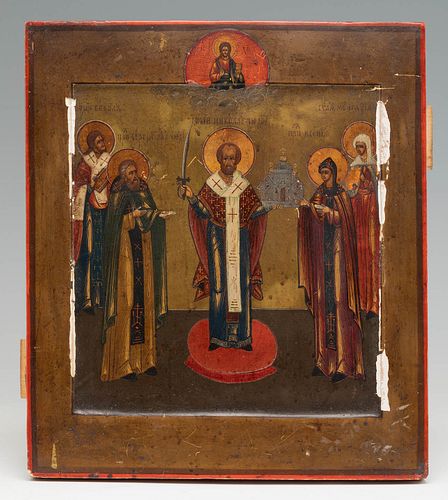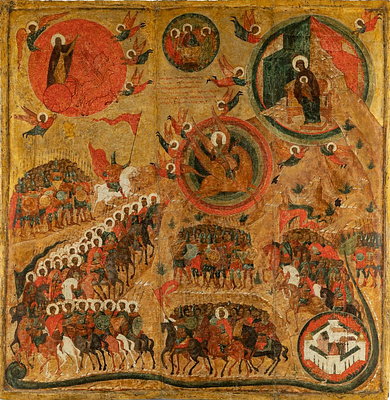Russian School of Moscow, 17th-18th century. "Saint Nicholas of Mozhaisk with Sergiy Radonezhskiy and Saint Xenia". Tempera on panel.
Lot 58
About Seller
Setdart Auction House
Carrer Aragó 346
Barcelona
Spain
Setdart Subastas was born in 2004 and is currently the first online art auction in Spain with solidity, prestige and reliability guaranteed by our more than 60,000 users. Setdart has a young, dynamic and enterprising team ready to successfully manage the purchase and sale of art works through custom...Read more
Estimate:
EUR€2,000 - EUR€2,500
$2,150.54 - $2,688.17
Absentee vs Live bid
Two ways to bid:
- Leave a max absentee bid and the platform will bid on your behalf up to your maximum bid during the live auction.
- Bid live during the auction and your bids will be submitted real-time to the auctioneer.
Bid Increments
| Price | Bid Increment |
|---|---|
| EUR€0 | EUR€10 |
| EUR€200 | EUR€25 |
| EUR€500 | EUR€50 |
| EUR€1,000 | EUR€100 |
| EUR€3,000 | EUR€200 |
| EUR€5,000 | EUR€500 |
| EUR€10,000 | EUR€1,000 |
| EUR€20,000 | EUR€2,000 |
| EUR€50,000 | EUR€5,000 |
About Auction
By Setdart Auction House
Sep 23, 2021
Set Reminder
2021-09-23 10:00:00
2021-09-23 10:00:00
America/New_York
Bidsquare
Bidsquare : RUSSIAN ICONS
https://www.bidsquare.com/auctions/setdart-auction-house/russian-icons-7431
Setdart Auction House sofia@setdart.com
Setdart Auction House sofia@setdart.com
- Lot Description
Russian School of Moscow, 17th-18th century. "Saint Nicholas of Mozhaisk with Sergiy Radonezhskiy and Saint Xenia". Tempera on panel. Measurements: 35 x 31 cm. The icon of interest represents an unusual composition of St. Nicholas the Miracle-Maker, therefore very valuable when appreciating the cult of the saint. It is a reference to the apparition of St. Nicholas the Wonderworker in Mozhaisk. There are several versions of hagiographies of the saint, describing his miracles during his lifetime and after his death. In 1087, the relics of the saint were transferred from Myra (Lycia) to the Italian city of Bari. After this event, the veneration of the saint developed in Russia. In honour of the transfer of the relics to the Russian Orthodox Church, a special feast was instituted, which did not exist in Byzantium. The saint was worshipped as a great bishop of Christ, equal to the rank of an apostle. In turn, the auctioned icon recounts an unusual passage from the postmortem life of the saint, which was properly developed in Russia. It is linked to the legend of the miraculous rescue of the town Mozhaisk, located between Moscow and Smolensk, from a sudden enemy attack. The inhabitants of Mozhaisk, whose town was an important defensive fortress on Russia's western borders, were accustomed to expect the threat of the Lithuanians and Poles. However, at the beginning of the 15th century, the inhabitants of the city faced a new one, the Tatar khan Yedigei. The Tatar nomads managed to burn down a large part of the town, including the church. After what happened, St. Nicholas appeared holding a sword in one hand and the fortress and the church in the other. In gratitude for the saint's miraculous help, the citizens of Mozhaisk carved a wooden icon, on which they depicted Miraculous Nicholas in the form they remembered him in the vision. One of the oldest versions of the icon, which is considered to be the first sculpture of St. Nicholas of Mozhaisk, was carved from oak in the 15th century. Since then, Miraculous Nicholas came to be perceived not only as the patron saint of Mozhaisk, but also as the defender of all the cities of the Russian land. For example, a stone church of St. Nicholas of Mozhaisk was built in Murom with the money of Ivan the Terrible after a successful campaign in Kazan. The sword of St. Nicholas is a reminder of the spiritual sword, which, according to St. Paul, "is the Word of God". In the case of this icon, the church is depicted without the walled building of the Mozhaisk Kremlin.
- Shipping Info
-
In-house shipping available. Please inquire at admin@setdart.com.
-
- Buyer's Premium



 EUR
EUR CAD
CAD AUD
AUD GBP
GBP MXN
MXN HKD
HKD CNY
CNY MYR
MYR SEK
SEK SGD
SGD CHF
CHF THB
THB














